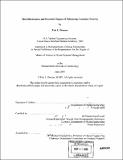The effectiveness and economic impact of enhancing container security
Author(s)
Dresser, Eric L. (Eric Lane)
DownloadFull printable version (11.93Mb)
Other Contributors
Massachusetts Institute of Technology. Dept. of Ocean Engineering.
Advisor
Hauke Kite-Powell.
Terms of use
Metadata
Show full item recordAbstract
Over the past few decades, international containerized shipping has evolved to become the main artery of global trade, providing both convenient and inexpensive access to goods from markets around the world. Yet the very size and efficiencies that have made container shipping such an attractive means of transport have also created a system that is highly vulnerable to terrorist exploitation. This paper outlines the current initiatives taken by both the public and private sector to address the security vulnerabilities in the container industry. The solution targets three main areas for, security: documentation/information, physical security, and inspections. The technology utilized to improve the physical security of the container can also be used to track shipments and secure the container from pilferage. This generates a win-win relationship between enhancing container security while improving supply chain information and control. An economic model is used to demonstrate the cost savings and cost avoidance from the information and control provided by security technologies. The savings to shippers more than offsets the cost of implementing these technologies. This is a valuable approach to solving the problem of container security because it concurrently provides incentive to the private sector and protects global interests.
Description
Thesis (S.M.)--Massachusetts Institute of Technology, Dept. of Ocean Engineering, 2004. Includes bibliographical references (p. 96-101).
Date issued
2004Department
Massachusetts Institute of Technology. Department of Ocean EngineeringPublisher
Massachusetts Institute of Technology
Keywords
Ocean Engineering.